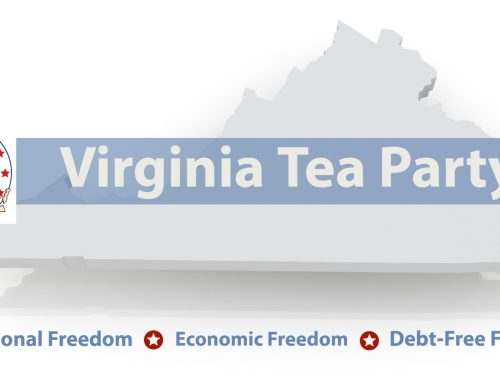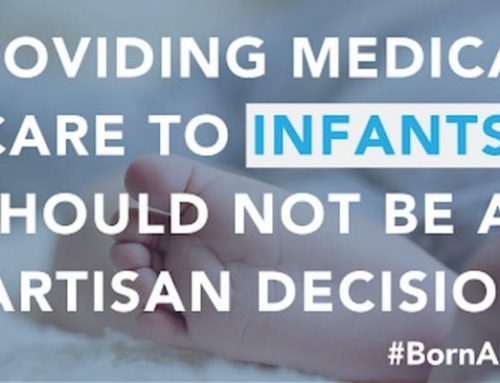We received the following update from Attorney General Cuccinelli today on the status of the health care lawsuit. Pay careful attention to the credit he gives to the Virginia Tea Party movement at the end!
—————————————————————————————————————-
August 8, 2010
Dear Friends,
Okay folks, last week was a busy week with the health care ruling (which we were expecting, without knowing the outcome) and the immigration explosion (which we were not really expecting).
To sum up re immigration, the only people really surprised by my legal opinion on the subject were people unfamiliar with law enforcement’s authority. Of course, that includes the press, so they went nuts. Let’s leave this topic for another day because the health care suit is so important, that it warrants discussion before all other current topics.
Last Monday – The End of Round 1
On July 1st, we had oral argument in Virginia’s health care lawsuit against the federal government. The feds had filed a motion asking the court to dismiss the case without deciding the constitutionality of the health care bill.
In the morning of August 2nd, the Judge denied the federal government’s motion to dismiss the case – rejecting every single argument advanced by the feds in support of their motion.
Virginia had to win on every argument at this stage, because if the court found that there was even one reason that the case should not go forward, it would have ended right there.
Every constitutional law case includes at least two rounds. Round 1 is the motion to dismiss, typically including claims by the government that the plaintiff is not injured or that their injury is not “ripe,” i.e., it hasn’t happened yet.
Our case included both of those arguments, plus two more.
The Feds’ Attacks
The federal government made four separate attacks on our complaint:
1) That Virginia was not injured by the health care law (“HC law”);
2) That even if Virginia was injured, such injury was not ripe because the individual mandate does not come into effect until January 1, 2014;
3) The Anti-Injunction Act bars Virginia’s suit; and
4) That Virginia has not stated a claim on which relief could be granted. This is the one that begins to touch on the substance of the constitutional claims, and it has three sub-parts in which the feds claimed that the HC law was constitutional under the commerce clause, the taxing power, and the necessary and proper clause.
Virginia’s Responses
Not surprisingly, we resisted the feds’ motion to dismiss. In summary fashion, here is what Virginia argued in defense of the legitimacy of its lawsuit:
1) Virginia was injured because our own Health Care Freedom Act (“HCFA”) protects Virginians from a health insurance mandate, and absent action by the courts, the supremacy clause of the U.S. Constitution would have the HC law trumping our HCFA. That would be fine under our constitutional system, except for the fact that the HC law is unconstitutional. So, because Virginia would lose the right to maintain its own law because of the HC law, Virginia is injured. The court agreed.
2) Virginia argued that the case is ripe under the law because the Supreme Court has generally said that if the only thing that needs to happen between now and a legal collision is the passage of time, then the case is ripe. There are no contingencies left. Virginia’s HCFA is in effect. The federal HC law is in effect. They will collide on January 1, 2014 absent a ruling favorable to Virginia, thus the case is ripe. The court agreed.
A funny item that happened here … as you know, the Florida case is going on at the same time as Virginia’s. And on June 16th the feds filed their motion to dismiss in that case. In their Florida brief, the made three different statements that were helpful to us in our case. One of them was their citation of case law that says exactly what I said in the paragraph before this one. So, to their surprise, we cited their Florida brief in our oral argument!
3) The Anti-Injunction Act (“AIA”) says that before you can sue on a tax law, you have to pay the tax. Needless to say, Virginia’s position is that the ‘penalty’ is not a tax, AND Virginia would never, under any circumstances, have to pay the penalty! So, the AIA does not apply in this case. The court agreed.
4) The big one… because it’s more than one. Basically, the feds claimed that even if the court accepted our complaint in its entirety, we still couldn’t win. Often said by lawyers as ‘not stating a claim upon which relief may be granted.’
The judge’s comments here were looked at most closely for hints about what he may do in his summary judgment ruling later, as all of these subjects will be the focus of that round.
Regarding the claim by the feds that the commerce clause provides them the authority to enact the HC law, the judge said that that may be true (he didn’t decide it yet), but if so, it will be the new outer limit of commerce clause jurisprudence. He said the HC law goes farther than anything that has been found constitutional ever before. So, we’re in constitutional never, never land re the commerce clause. Such a state of affairs needs to be addressed according to the judge, so the case will go on.
The judge proceeded to say basically the same thing about the taxing power. Again, we’re in “never, never land” regarding the taxing power.
The judge didn’t really say much about the necessary and proper clause. This clause is used to ‘fill in’ the power provided to the federal government under the other clauses, though it’s not supposed to extend that power.
Of special interest was the judge focusing on our characterization of what was (or was not) going on re the individual mandate in the HC law. He talked a bit about the fact that what was being regulated (or an attempt was being made to regulate) was inactivity. I liked the word he chose: “repose.” A state of repose – i.e., doing nothing.
So, what’s next?
What’s Next
How’s that for a transition?
From early September to early October, both sides will file motions for summary judgment and oppositions and replies (3 briefs per side). Additionally, amici will file their briefs by early October.
Then, on October 18th we will have oral argument on the constitutionality of the HC law.
If the judge does what he did at oral argument on the motion to dismiss, he’ll tell us at that time about how long he expects to take to decide and issue an opinion. Best guess now? Around Thanksgiving, but we’ll see. Maybe longer, probably not shorter.
Whichever side loses will undoubtedly appeal, and whoever loses there will appeal the Supreme Court. I would be shocked if they didn’t take this case, so that’s who is ultimately going to decide the outcome.
Regardless, I’d always rather go to round two having already won round one! And this week, we survived by winning round one.
I want to remind all of you that haven’t already done so, please go to our web site at www.Cuccinelli.com, and watch the video discussion on the case. It’s very educational and it will help prepare you to discuss the case with your friends and neighbors.
While it would be nice if we didn’t have to worry about such an unconstitutional bill, it is an opportunity to explain first principles to folks, so please take advantage of this educational moment!
Finally, on a side note, and as sort of a distant reminder… the Virginia HCFA is a big part of our case. It is what distinguishes our case from the Florida case, and because of it, you may see very different courses for the two cases. The Virginia HCFA was the major legislative effort of the Tea Parties in Virginia last year, so all of you Tea Party types that helped get Virginia’s HCFA – thank you – as it was an important element in the motion to dismiss. Specifically, it provided a sovereign injury – the trumping of Virginia’s law under the supremacy clause – that was an important part of why we survived the motion to dismiss. Again, thanks to all that supported that effort!
Sincerely,
Ken Cuccinelli, II
Attorney General of Virginia





